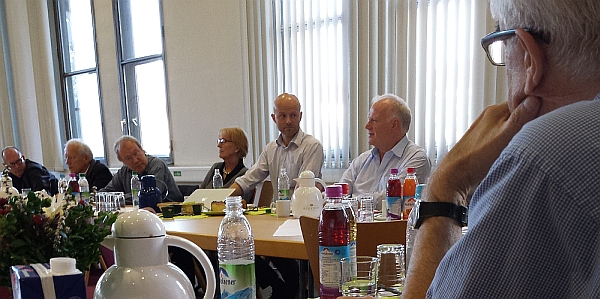
Somehow, we had lost sight of each other.
For 12 years, the theories and ideas of Ulrich Beck had become a kind of significant other for me. Ulrich had even been the reason, I abandoned my chemistry studies in 1997 and changed to sociology (oddly enough, from one Professor Beck to the other). His lecture on “Social Structure of the Federal Republic of Germany” in the Great Hall of the University of Munich was my first encounter with sociology. And what a furious encounter it had been!
While other professors opened their lectures with explaining the simplest basic concepts and statistics that you could also learn from reading a newspaper, Ulrich’s lecture started with an elaborate argument on why the basic concepts of “first modernity” – nation-state, social structure, social change – were already obsolete and able to survive only as a kind of “zombie concepts”. Many freshmen left the lecture with their heads spinning, but for me this was exactly what I needed. And a maximum contrast to chemistry.
My diploma thesis then focused on his concept of “internal globalization”. At the core was the idea that our world was much more globalized and hybrid on the inside as it appeared at first glance. To prove Ulrich Beck’s hypothesis that corporations had undergone an intensive process of inner globalization, I typed line by line from the United Nations Conference on Trade and Development statistical yearbooks and statistically analyzed the resulting dataset. The result then even became a nearly full-page footnote citation in his book “Macht und Gegenmacht im Globalen Zeitalter”.
The theory of “inner globalization” then slowly metamorphosed into a theory of Cosmopolitanism during the DFG Research Centre 536 on “Reflexive Modernization”. Once again, Ulrich demonstrated how quickly he and his ideas could evolve – while many of his peers only gradually understood and accepted globalization theory and Reflexive Modernization, he was already one step ahead and had again discovered a new dimension of social theory. Doing research together with Ulrich always meant: sociological theory in the fast lane. But when you were getting into it, it could quickly become the most exciting and rewarding experience.
After the end of the SFB in 2009, I left academia and joined a private research company. But this was never meant to be a final good-bye. Still, I was tracking the development of Munich sociology only marginally for the following five years. Until September 2014 when Ulrich Beck invited all his former assistants and staff for a reunion meeting by email.
The group met – somewhat decimated due to the German rail strike – in the Faculty Room of the University Munich. I told Ulrich that although not working in science anymore, there still were a lot of connections to his theory, in particular the theory of Cosmopolitization in my practical work. My impression was that he was quite delighted that his cosmopolitan project increasingly came to life outside the academic world. In addition, we discovered that we had a common theme again: the question of the immense contribution of the Internet and Social Media to the Cosmopolitization the world.
Suddenly, we were back again in a lively and productive exchange with many phone calls, emails and discussions about Big Data, Twitter analysis and memetic communication in his new office in the Schellingstrasse. In December we met in Paris at the workshop of his new EU research project at the Fondation Maison des sciences de l’homme. The participants came from Brazil, England, France, China, South Korea, Canada and Denmark. It was very inspiring to see how Ulrich’s ideas had evolved into a global research project – and he really seemed at home in the middle of this truly cosmopolitan research community.
I said goodbye to Ulrich with the good feeling that this would be the beginning of an exciting new phase of cooperation. In early January we wanted to meet again to continue working on “cosmopolitan data”. Unfortunately I was wrong. Suddenly learning that this should not be the beginning of a new phase, but just a final flare, still hurts a lot. But at the same time I’m grateful beyond words for the last two and a half months.
-.-